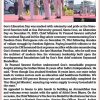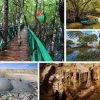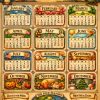Goa is abuzz with excitement as vintage bike and car owners, users, collectors and fans are decking […]
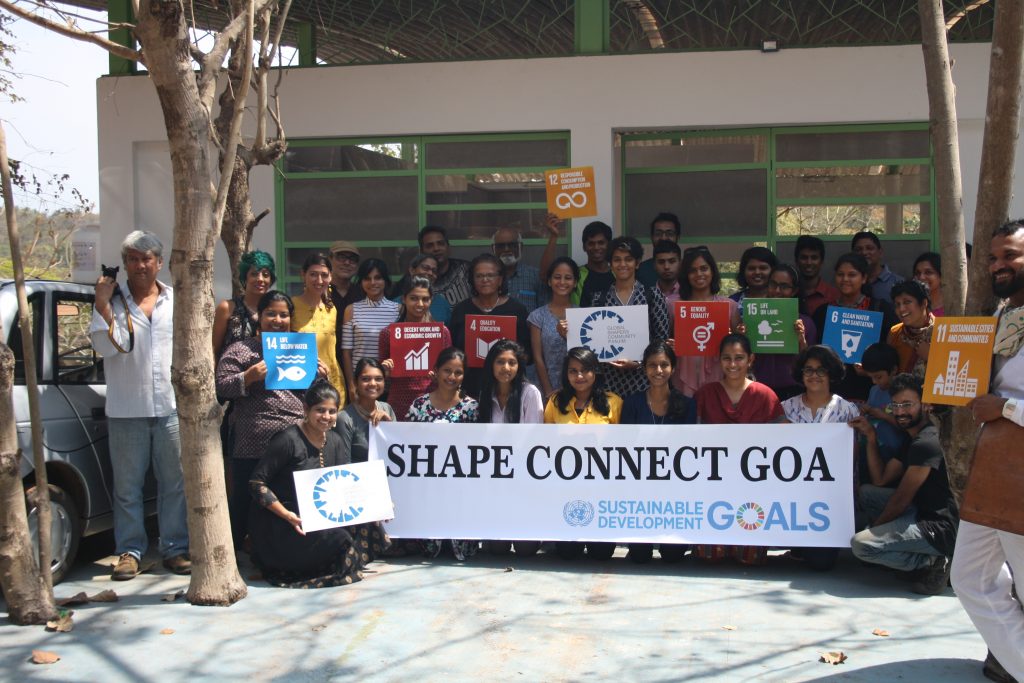
`WE ARE LITERATE BUT NOT EDUCATED IN GOA!’
Environment, March 11- March 17 2017 March 11, 2017GROUP PICTURE: Seeking a more sustainable lifestyle to save the Goa of old, key movers and shakers of the Global Shapers Panjim Hub are Gabrielle D’Cruz, Mrinmayee Thakur, Puja Mitra, Clinton Vaz, Tallulah D’Silva, Atul Borkar, Felly Gomes and others
Says marine conservationist Gabrielle D’Cruz at the Shape Connect Goa event organised by Global Shapers Panjin Hub at 1, Design Centre, Alto Porvorim, on
By Tara Narayan
THEY’RE a group of doers and they walk the talk, and also talk, talk, talk! They are planning to turn Goa into one of India’s most sustainable states! Good luck to them although luck may have nothing to do with, not as much as hard work anyway. They love Goa, that much is clear, and want to keep it clean and green. The government may pay only lip service or scant attention to such vital issues as ecology, environment, global warming, increasingly contaminated acidic oceans and how in the short and long run it is impacting civilisation, locally and globally – but this group of friends in togetherness care, and want to be go-getters.
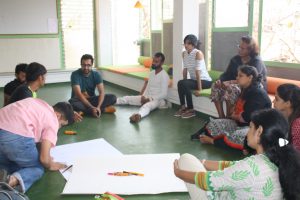
WORKING IN GROUPS FOR AIR, EARTH AND WATER: This earth group charted out a course of action for garbage disposal in their own village or area.
The challenge is to hang on to the green Goa of old vis-à-vis its garden of paradise status as so many niz Goemkars think. The good news is something good is happening, at the younger generation’s level at least! Hear them all earnestly engaged in soft and hard sell at a meet at Design Centre’s Kokum initiative at Alto- Porvorim, where there are still some green landscapes left to cherish and come home to. All is not concrete here as we found out while catching up with some of talk on hubs coming up courtesy Shape Connect Goa (of Global Shapers Panjim Hub).
Nature Warriors
THE group is made up of Jill Ferguson, Clinton Vaz, Puja Mitra, Anwesha Singbal, Tallulah D’Silva, Gabriella D’Cruz, curator Mrinmayee V Thakur, Atul Borkar, Felly Gomes, and others – experts and concerned, convinced citizens wanting to redress some of Goa’s
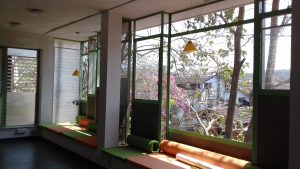
OUT SIDE IN: Letting the outdoors in with light and inspiration to live!
pressing problems in whatever way they can. In Goa we should be challenged by the UN’s Sustainable Development Goals, some to do with streamlining and dealing with wet and dry garbage. Wet is not much of a problem and can be converted into compost by almost anybody with a mind to do it.
The dry, non-biodegradable garbage is a huge problem. It is anyone’s guess what percent of it is of plastics and some dangerous kinds of litter need to be put away or re-cycled. Clinton Vaz is an ustad in dealing with garbage systems, both easy and difficult. He’s been advising, supervising, and helping folk interested in dealing with their waste, generated at the individual and housing society level. He’s a pioneer; seasoned and experienced. He convinced his family first about the need to live a sustainable lifestyle. His mum Melanie Vaz now cultivates an organic garden at home.
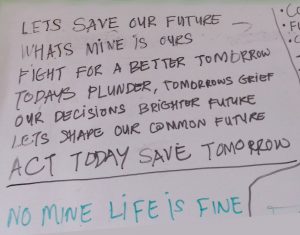
MESSAGE ON A BOARD: In not so many words at architect Dean D’Cruz office-think along the lines of it’s not your, my life, but our life!
Puja Mitra, co-founder of Terra Conscious, holds the cause of letting dolphins live in dignity and peace dear to her heart. It’s really marine health in totality, she says. The health of the oceans and other water bodies too. Believe it or not, Goa does have live coral reefs out at Grand Island, which sea adventurers and domestic tourists seek out for fun picnics and a spot of diving in waters which she says “are not so murky now post the mining ban”.
Dolphin Trips
BUT it’s the tourist dolphin trips out in coastal and estuarine habitats, which are of concern to her. It’s okay to want to see dolphins for fun, but we need to be better educated and behaved. We should not behave like jerks when out on a dolphin trip! “Please don’t chase dolphins like maniacs,” she says. Dolphins are highly intelligent and sensitive mammals and are mostly estuary residents. Some species like humpback dolphins won’t venture into deeper waters, but gambol and live out their lives within three to five kilometers off the coast.
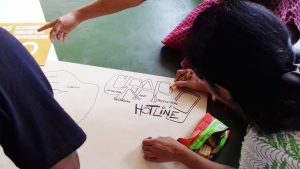
SERVICES: Graph is for Crap Hotline, connecting people to services and tools on hire.
Puja has been busy for some time now trying to collect data and put it together to encourage responsible tourism. She’s working in a collaborative marine conservation initiative with the Goa Department of Tourism, Goa Forest Department and WWF-India (supported by International Union for Conservation of Nature). During the season, she recounted in her talk, there are any number of tourist boat operators who offer dolphin trips off Dona Paula or Coco Island or elsewhere along the coastal belt of Goa. “At one count we counted 350 to 400 operators and these boats create stress for the dolphins. Any creature living in stress is affected. Studies have shown that reproductive health is affected among other things!”
Why should we laugh thinking of dolphins’ reproductive health? We don’t laugh thinking of human reproductive health, do we? And yet again we should understand that when it comes to sustainability, “the ocean is the big guy in our lives”. “It contributes up to 70 per cent of our global oxygen and around three billion worth of our protein. It’s five per cent of our GDP. The ocean is our VIP provider, so we need better marine ecosystems protection,” she urges.
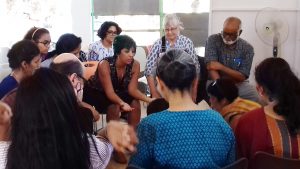
UNITED IN EFFORT: Call it brainstorming, for we’re all in it together
She hands out leaflets to tourist operators to educate tourists about dolphins. “We have too many tourists and too many boats chasing dolphins, corralling them and in general making their life miserable. If we carry on like this, there’ll be no more dolphins left to see!” She adds, “Come on one of my dolphin trips and see the difference. We go out to sea and anchor somewhere quietly. Sometimes the dolphins venture up for a showing, sometimes they don’t. But our trips may be two hours long and we don’t chase them!” Watching dolphins is a quiet pleasure – no loud music, no screaming, no drinking beer or alcohol, and no chucking litter in the water.
But this is not so with the commercial trips off Goa’s coastal waters. When there’s a mad rush of boats in a competitive orgy, the dolphins have a tough time protecting their young ones and are really hassled. “Is
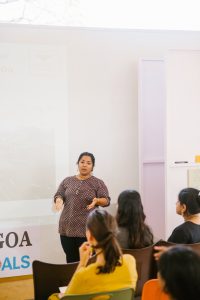
DOLPHIN WOMAN: Puja Mitra calls for respect for the ocean and its residents for our own sustainable lifestyles.
this responsible tourism?” asks an exasperated Puja. Her group works hard to win over those who conduct dolphin trips. There are do’s and don’ts to be observed strictly. Goa is a coastal state and we need to take care of our water bodies, be they seas, rivers, ponds, or wells. The ocean is our bounty and beauty! We live off it in so many ways. It’s time we returned the compliment and complement it by respecting it and the creatures of the water.
Scant Respect
THERE’S scant respect for water in Goa and even scantier love and affection, sighs Puja, and all this must change. Excuse her, it is changing, and she and her friends are doing their best, drawing on all supportive help.
Felly Gomes of Assagao spoke passionately about turning his beautiful “village of flowers” into a community mindful of such things as the need to be eco-friendly and appreciate the heritage of old. He and his wife Beatrice (a Brazilian woman with causes dear to her heart) have been having local organic baazar and community meets at their Happy Home centre here. They take folk on walks, bring in the migrant children into their activities of an eco-friendly kind, encourage organic farming, and teach the tricks of staying healthy through yoga and other useful camps. Live happy through song and dance and working hard! That’s his motto and his spirited joie de vivre is contagious. He does modern dancing like a dream. Learn from him if you can!

SOOTHING SCENES: A soothing green valley view from Design Center’s Kokum at Alto-Porvorim.
Atul Borkar asked how many people in Goa know that we have otters. Nobody knew! Otters are riverine-sea animals and Goa has some places where one may see otters in and out of water, breeding and in general offering a treat for wildlife enthusiasts. He would like to do a study of otters in Goa. The more experienced Tallulah D’Silva (architect, founding curator of Global Shapers Panjim) helped by making a visual chart of all suggestions for promoting a more aware and sustainable Goa. They are all set to put into place hubs for various activities to promote education and offer services of an eco-friendly, sustainable Goa kind.
The most quiet of this ardent group, Gabriella D’Cruz (a marine conservationist), exclaimed, “It is not enough to be literate in Goa, we must be educated too!” It’s a sentiment everyone present endorsed as they participated in the discussions and helped formulate a long-term action plan. Shape Connect members must work on creating a conscience on the subject of sustainable progress and development, which is in the interests of everyone’s wellbeing and this includes the wellbeing of the earth too.
Goans must seek ways and means to switch over to a more sustainable lifestyle. Pick up the challenges and make the changes small and big. Really, we have very little time at our disposal before we are disposed ourselves. It’s as soon as possible for this group of Goans, niz Goenkars, Global Shapers in Goa. Join them by contributing in kind or in cash – come to think of it, in kind is more important for if the cause is right, cash will come in almost automatically.
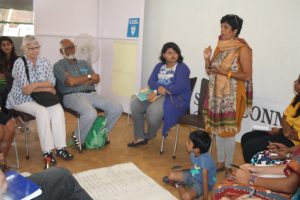
SENIOR CONTRIBUTION: Interested senior citizens contribute towards the discussions. This group was led by green architect Tallulah D’Silva.
SOME trivia: Everyone got water, tea, and a lunch of some delectable vegetarian biryani with excellent raita to go with it. Wash your own mugs and plates in the kitchen please! Kokum and Design Centre at 1, Design Valley, deep in the heart of Alto Porvorim, are worth going to see. Ardent green architect (he’s the most exemplary of them all), Dean D’Cruz, works from here. His offices are located here with the activity center, Kokum, attached. It’s run by daughter Gabriella D’Cruz now.
At first, one feels like asking, buildings? What buildings? Nah. You call these buildings? Once you see the twin properties of Design Centre you’ll revise all your notions of how one may live life more or less with the outdoors with Mother Earth herself coming indoors to keep you company. One gets an idea of how we may live so as to leave behind a carbon footprint so light that the good Earth itself will take care of you with blessings as powerful as all your prayers forever!
